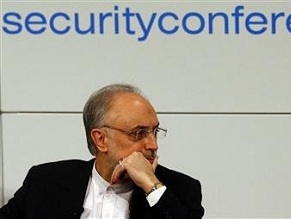|
World Jewish News

Iranian Foreign Minister Ali Akbar Salehi on Sunday said the new round of talks would be held February 25 in Kazakhstan.
|
New Iran nuclear talks later this month in Kazakhstan, Biden says Obama administration willing to hold direct talks with Tehran
05.02.2013, Israel and the World The six major powers have proposed to hold a new round of nuclear talks with Iran in late February, a spokesman for European Union (EU) foreign policy chief Catherine Ashton said.
The six powers are the five permanent members of the UN Security Council, the United States, Russia, China, France, Britain plus Germany.
Iranian Foreign Minister Ali Akbar Salehi on Sunday said the new round of talks would be held February 25 in Kazakhstan.
Salehi spoke at Munich Security Conference, a day after US Vice President Joe Biden said the Obama administration remains willing to hold direct talks with the Islamic Republic.
"That offer stands, but it must be real and tangible, and there has to be an agenda that they're prepared to speak to," Biden said. "We are not just prepared to do it for the exercise."
The United States and Iran haven't had diplomatic relations since 1980. But US and Iranian diplomats had occasional talks in Baghdad during the eight-year American war in Iraq, and US President Barack Obama held out the prospect of talks with Iran when he came int office in 2009.
Earlier last month, the new US Secratary of State John Kerry also mentioned the possibility of talks with Iran and Obama's nominee for Secretary of Defense, Chuck Hagel, has in the past called for direct talks with Iran. It was a point of contention during his confirmation hearing, with some Republicans accusing him of being too soft on Iran.
"We take these statements with positive consideration,” Salehi said.
Iran's refusal to shut down its uranium enrichment plants has led to tougher and tougher economic sanctions that have crippled its economy. An oil embargo and banking restrictions have crashed the Iranian currency, the rial. New US sanctions imposed in January targeted a handful of companies and individuals that Washington says are providing materials and technology to Tehran's nuclear program.
Biden said Saturday that U.S. policy "is to prevent Iran from acquiring a nuclear weapon," and said the clerical leadership in Tehran "need not sentence their people to economic deprivation and international isolation."
"There is still time, there is still space for diplomacy -- backed by pressure -- to succeed," he said. "The ball is in the government of Iran's court, and it's well past time for Tehran to adopt a serious, good-faith approach to negotiations with the P-5 plus 1."
Israeli Prime Minister Benjamin Netanyahu, has urged the United States -- his country's leading ally -- to set a "red line" for nuclear development and make clear that if Iran crosses that line, it would risk war.
Netanyahu, who was tasked to form a new government, said Sunday that the job of preventing a nuclear-armed Iran "is becoming more complex, since Iran is equipping itself with cutting-edge centrifuges that shorten the time of enrichment. We must not accept this process."
by: Yossi Lempkowicz
EJP
|
|
